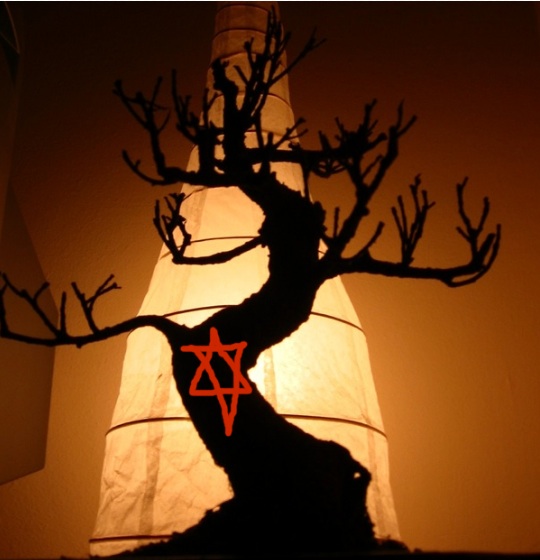 Is Feng Shui kosher? An Israeli world musician Yisrael Borochov discovers some unusual connections between the Chinese practice of Feng Shui and ancient Jewish traditions of how to live in harmony with nature
Is Feng Shui kosher? An Israeli world musician Yisrael Borochov discovers some unusual connections between the Chinese practice of Feng Shui and ancient Jewish traditions of how to live in harmony with nature
I was skimming through one of the main books dealing with detailing the Jewish mitzvas (commandments), and was really surprised to feel like I was actually reading a Feng Shui guide. Some of you might say: “Oy, those religious people are at it again. But I’m not going to create an ideology of living one’s life according to the Torah, and I also promise not to try to sneak in a sermon recommending a return to the lifestyle of the period before Thomas Edison invented the light bulb.
My intention is to share an “enlightening” experience that I had when reading a chapter of the book, The Abbreviated Shulchan Aruch, a Jewish code of law book. I found an incredible parallel between what was written there, and what I’ve read about the Chinese practice of Feng Shui.
Feng Shui is an ancient Chinese method for organizing objects and structures in order to achieve harmony with nature – a method from the Taoist religion. Traditional Feng Shui was developed in China to synchronize one’s home and environment with the energy structures and systems of the universe.
The Shulchan Aruch is a very dense book that details all of the behavior and actions of a Jewish person in a variety of situations, from the date of his or her birth (and even beforehand) until the date of his or her death (and even, you guessed correctly, afterwards).
The book is a condensation of Jewish halakha (Jewish religious law) – the same laws of halakha that, according to Jewish understanding, were orally transmitted by God to Moses on Mount Sinai thousands of years ago, after the exodus from Egypt and before entry into the promised land.
In other words, everything that happens in between the two aforementioned events between the person and others, in their environment, and concerning the property and property of others; and between a person and their creator, the mitzvahs they should do, and celebratory events and prayers –– is written in the book.
The Shulchan Aruch is one of the few halakha books that is accepted by all streams of Judaism, and that has been true from the time it was published until today.Written in Safed by Rabbi Joseph Karo, it was first published during the 16th century in Venice.
Coincidentally, I was in Safed a few days ago and wanted to visit Rabbi Joseph Karo’s synagogue (which still exists). The guard opened a crack in the door and told me in a combination of English (with a strange accent) and hand gestures that he was going to eat and that now was not a good time for him to let me in. I guess that’s what happens when you’re transformed from a human being into a monument – you’re equipped with a guard and everything may not turn out exactly as you had planned.
How to light your room
With regards to room lighting, Feng Shui treats this matter in great detail, especially the angles of sunlight and the direction and placement of windows in rooms.
The Shulchan Aruch addresses the lighting of a residence and says that: “ If possible, do not dwell in an open place on the northern or eastern sides during the summer…
“When the sun radiates light on a place that is then reflected into the room, this light damages the eyes and therefore beware of dwelling in a house where all the windows are on the northern side.”
Later on the Shulchan Aruch recommends avoiding reflected light, even if the windows in the house are on the east, south, or west sides.
Bed orientation
According to Feng Shui theory, the combination of various energy centers in our home determines our fortune. The bedroom is one of those important centers.
According to this Chinese theory, with regards to the orientation of the bed, each person has four good luck and bad luck directions – the bed should be oriented so that it faces the good luck direction.
The Shulchan Aruch also discusses the issue of bed orientation as an important factor in a person’s condition (the origin already appeared in the Gemara Masechet Brachot, page ‘Hey’).
The book instructs placing the bed so that the head points north and the feet point south. That is the full direction according to the Shulchan Aruch.
Compared with the Chinese, we Jews apparently always complicate things a bit: As in the joke that we made up about ourselves that says that for every two Jews there are three opinions, the Kabbalah says that one should indeed sleep in a bed with a north-south orientation but the explanation is completely different.
The Kabbalah agrees that one should sleep on a bed oriented from north to south, but that the body should lay perpendicular to the bed so that the northern side is on the right of the body and the southern side is on the left.
In other words, one should lay with his/her head pointing east and feet pointing west.
In any event, we can conclude that both of the aforementioned opinions agree that the head should not be pointing south or west.
Under the bed
The Chinese theory recommends that the empty space beneath a bed should remain empty and not be used for storage. According to Feng Shui, chaos beneath a bed damages something that is parallel to the subconscious.
The Shulchan Aruch does not contain concepts such as the subconscious, but refers to good spirits or bad spirits.
With regards to the space beneath the bed, the book writes that during sleep no food or drink items should be placed beneath the bed, even if they are covered, because they are associated with bad spirits.
Other things that I saw in the Shulchan Aruch that sounded like Feng Shui:
A person will always strive to dwell in a place where the air is clear and clean, in a high altitude and in a wide building.
It is good to clean the house often with good scents and helpful smokes.
A person should be careful not to heat his/her house excessively during the winter, as is the habit of thoughtless people.
This made me wonder about the origins of the Jewish/Chinese connection: The first time Jews arrived from the Middle East to China was, was the 8th or maybe the 7th century by earliest accounts.
Feng Shui theory has been in existence for thousands of years and the events at Mount Sinai also took place a few thousand years ago, so when did the positions of these two ancient cultures start to correspond?
I always suspected that if some worldwide consent or coordination were ever to take place, it would begin with preserving nature and not with political and economic interests, which usually lead to factions. Does nature grant us as a gift alongside the resources that we are blessed with the start of the formula for building world peace?
– Yisrael Borochov – Musician, creator, and producer
Image via cirque-du-pablo




Thanks for the excellent article! I just want to make a comment that according to the ancient vedic tradition, one should sleep either with one’s head pointing towards the east or the south. The head to the east is good for student and those seeking enlightenment. The head to the south is good for sound health.
Traditionally children should sleep with their head towards the east as this helps with mental development and studies. Adults are generally recommended to sleep with their heads towards the south.
Sleeping with the head towards the north is considered the worst and absolutely bad for a person and should be avoided at all costs.
The reason for this is that when the head is placed towards the south, a harmony is created between the body and the earth’s north/south pole currents. When the head is faced to the north, the opposite occurs.
key point is how to live in harmony with Nature !
Oluf, the point was not to explain how Feng Shui does or does not clash with Judaism, but to prove the existence of a connection, or a “mystical bond”, between them.
First of all, I really don’t appreciate the way the author introduces the Shulchan Aruch. It obviously doesn’t include every single piece of halacha, because halacha is a continuously developing body of laws that doesn’t depend on a single source. “Accepted by all streams of Judaism”?! If you have any idea of what Judaism is, you know that nothing is accepted by all streams of Judaism, and certainly not a book! The statement that Shulchan Aruch “has been true from the time it was published until today” I simply don’t understand. Are there books that just stop being “true” at some point?
About the similarity, it’s important to keep in mind the well-known fact that throughout history, with the exclusion of the last couple of centuries, great rabbis were usually also great scientists and most often great physicians. They were always fascinated by any influence of nature on man, much like in the Chinese culture. I’m not sure that this interest could be compared with Feng Shui specifically, but it’s definitely true that many times in history, different people in different places thought of the same things at the same time. Jewish and Chinese civilizations certainly were not cultivated on an island.
I’m not sure I get this article? But as feng shui is not a religion but rather a way of life I don’t see why it would “clash” with any religion.